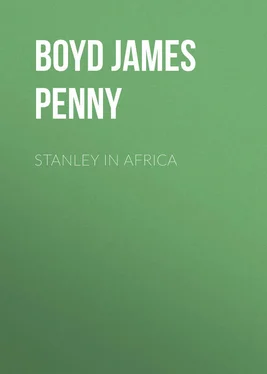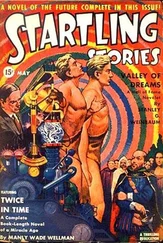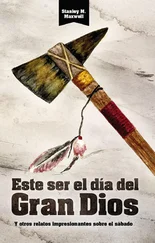James Boyd - Stanley in Africa
Здесь есть возможность читать онлайн «James Boyd - Stanley in Africa» — ознакомительный отрывок электронной книги совершенно бесплатно, а после прочтения отрывка купить полную версию. В некоторых случаях можно слушать аудио, скачать через торрент в формате fb2 и присутствует краткое содержание. Жанр: foreign_antique, foreign_prose, на английском языке. Описание произведения, (предисловие) а так же отзывы посетителей доступны на портале библиотеки ЛибКат.
- Название:Stanley in Africa
- Автор:
- Жанр:
- Год:неизвестен
- ISBN:нет данных
- Рейтинг книги:3 / 5. Голосов: 1
-
Избранное:Добавить в избранное
- Отзывы:
-
Ваша оценка:
- 60
- 1
- 2
- 3
- 4
- 5
Stanley in Africa: краткое содержание, описание и аннотация
Предлагаем к чтению аннотацию, описание, краткое содержание или предисловие (зависит от того, что написал сам автор книги «Stanley in Africa»). Если вы не нашли необходимую информацию о книге — напишите в комментариях, мы постараемся отыскать её.
Stanley in Africa — читать онлайн ознакомительный отрывок
Ниже представлен текст книги, разбитый по страницам. Система сохранения места последней прочитанной страницы, позволяет с удобством читать онлайн бесплатно книгу «Stanley in Africa», без необходимости каждый раз заново искать на чём Вы остановились. Поставьте закладку, и сможете в любой момент перейти на страницу, на которой закончили чтение.
Интервал:
Закладка:
On August 17, 1882, he sailed from Loando for Lisbon. On his arrival in Europe, he laid before the International Association a full account of the condition of affairs on the Congo. He had founded five of the eight stations at first projected, had constructed many miles of wagon road, had left a steamer and sailing vessels on the Upper Congo, had opened the country to traffic up to the mouth of the Kwa, a distance of 400 miles from the coast, had found the natives amiable and willing to work and trade, and had secured treaties and concessions which guaranteed the permanency of the benefits sought to be obtained by the expedition and the founding of a great Free State. Yet with all this he declared that “the Congo basin is not worth a two-shilling piece in its present state, and that to reduce it to profitable order a railroad must be built from the lower to the upper river.” Such road must be solely for the benefit of Central Africa and of such as desire to traffic in that region. He regarded the first phase of his mission as over – the opening of communication between the Atlantic and Upper Congo. The second phase he regarded as the obtaining of concessions from all the chiefs along the way, without which they would be in a position to force an abandonment of every commercial enterprise.
The International Association heard him patiently and offered to provide funds for his more extensive work, provided he would undertake it. He consented to do so and to push his work to Stanley Falls, if they would give him a reliable governor for the establishments on the Lower Congo. Such a man was promised; and after a six weeks’ stay in Europe, he sailed again for Congo-land on November 23, 1882.
He found his trading stations in confusion, and spent some time in restoring order, and re-victualling the empty store-houses. The temporary bridges on his hastily built roads had begun to weaken and one at the Mpalanga crossing gave way, compelling a tedious delay with the boats and wagons he was pushing on to the relief of Leopoldville. Here he found no progress had been made and that under shameful neglect everything was going to decay. Even reciprocity with the natives had been neglected, and garrison and tribes had agreed to let one another severely alone. To rectify all he found wrong required heroic exertion. He found one source of gratification in the fact that two English religious missions had been founded on the ground of the Association, one a Baptist, the other undenominational. Dr. Sims, head of the Baptists, was the first to navigate the waters of the Upper Congo, and occupy a station above Stanley Pool, but soon after the Livingstone, or undenominational mission, established a station at the Equator. Both missions now have steamers at their disposal, and are engaged in peaceful rivalry for moral conquest in the Congo Basin.
The relief of Leopoldville accomplished, Stanley started in his steam-launches, one of which was new (May 9, 1883), for the upper waters of the Congo, with eighty men. Passing his former station at Mswata, he sailed for Bolobo, passing through a country with few villages and alive with lions, elephants, buffaloes and antelopes, proof that the population is sparse at a distance from the river. Beyond the mouth of the Lawson, the Congo leaves behind its bold shores and assumes a broader width. It now becomes lacustrine and runs lazily through a bed carved out of virgin soil. This is the real heart of equatorial Africa, rich alluvium, capable of supporting a countless population and of enriching half a world.
The Bolobo country is densely populated, but flat and somewhat unhealthy. The villages arise in quick succession, and perhaps 10,000 people live along the river front. They are peaceful, inclined to trade, but easily offended at any show of superiority on the part of white men. Ibaka is the leading chief. He it was who conducted negotiations for Gatula, who had murdered two white men, and who had been arraigned for his double crime before Stanley,
The latter insisted upon the payment of a heavy fine by the offending chief – or war. After long deliberation, the fine was paid, much to Stanley’s relief, for war would have defeated the whole object of his expedition. Ibaka’s remark, when the affair was so happily ended, was: “Gatula has received such a fright and has lost so much money, that he will never be induced to murder a man again. No, indeed, he would rather lose ten of his women than go through this scene again.” A Bolobo concession for the Association was readily obtained in a council of the chiefs.
And this station at Bolobo was most important. The natives are energetic traders, and have agents at Stanley Pool and points further down the river, to whom they consign their ivory and camwood powder, very much as if they were Europeans or Americans. They even acquire and enjoy fortunes. One of them, Manguru, is a nabob after the modern pattern, worth fully $20,000, and his canoes and slaves exploit every creek and affluent of the Congo, gathering up every species of merchandise available for the coast markets. Within two hours of Bolobo is the market place of the By-yanzi tribe. The town is called Mpumba. It is a live place on market days, and the fakirs vie with each other in the sale of dogs, crocodiles, hippopotamus meat, snails, fish and red-wood powder.
Negotiations having been completed at Bolobo, and the station fully established, Stanley started with his flotilla, May 28th, on his way up the river. The natives whom he expected to confront were the Uyanzi and Ubangi. He was well provided with guides from Bolobo, among whom were two of Ibaka’s slaves. The shores of the river were now densely wooded, and the river itself spread out to the enormous width of five miles, which space was divided into channels by islands, miles in length, and covered with rubber trees, tamarinds, baobab, bombax, red-wood, palms and date palms, all of which were interwoven with profuse creepers, making an impenetrable mass of vegetation, royal to look upon, but suggestive of death to any one who dared to lift the verdant veil and look behind.
Slowly the tiny steamers push against the strong currents and make their way through this luxuriant monotony, broken, to be sure, every now and then, by the flit of a sun-bird, the chirp of a weaver, the swish of a bamboo reed, the graceful nodding of an overgrown papyrus, the scurrying of a flock of parrots, the yawn of a lazy hippopotamus, the plunge of a crocodile, the chatter of a disturbed monkey colony, the scream of the white-collared fish eagle, the darting of a king-fisher, the pecking of wag-tails, the starting of jays and flamingoes. Yet with all these appeals to eye and ear, there is the sepulchral gloom of impervious forest, the sad expanse of grassy plain, the spectral isles of the stream, the vast dome of tropical sky, and the sense of slowness of motion and cramped quarters, which combine to produce a melancholy almost appalling. It is by no means a Rhine journey, with gay steamers, flush with food and wine. The Congo is one-and-a-half times larger than the Mississippi, and with a width which is majestic in comparison with the “Father of Waters.” It shows a dozen varieties of palm. Its herds of hippopotami, flocks of gleeful monkeys, troops of elephants standing sentry at forest entrances, bevies of buffaloes grazing on its grassy slopes, swarms of ibis, parrots and guinea-fowl fluttering everywhere – these create a life for the Congo, surpassing in variety that of the Mississippi. But the swift-moving, strong, sonorous steamer, and the bustling river town, are wanting.
At last night comes, and the flotilla is twenty miles above Bolobo. Night does not mean the end of a day’s work with the expedition, but rather the beginning of one, for it is the signal for all hands to put ashore with axes and saws to cut and carry a supply of wood for the morrow’s steaming. A great light is lit upon the shore, and for hours the ringing of axes is heard, varied by the woodman’s weird chant. The supply is borne back in bundles, the tired natives eat their cassava bread and boiled rice suppers, the whites partake of their roast goat’s meat, beans, bananas, honey, milk and coffee, and then all is silence on the deep, dark river. The camp is Ugende, still in the By-yanzi country. The natives are suspicious at first, but are appeased by the order that every member of the expedition shall make up his reedy couch in close proximity to the steamers.
Читать дальшеИнтервал:
Закладка:
Похожие книги на «Stanley in Africa»
Представляем Вашему вниманию похожие книги на «Stanley in Africa» списком для выбора. Мы отобрали схожую по названию и смыслу литературу в надежде предоставить читателям больше вариантов отыскать новые, интересные, ещё непрочитанные произведения.
Обсуждение, отзывы о книге «Stanley in Africa» и просто собственные мнения читателей. Оставьте ваши комментарии, напишите, что Вы думаете о произведении, его смысле или главных героях. Укажите что конкретно понравилось, а что нет, и почему Вы так считаете.












